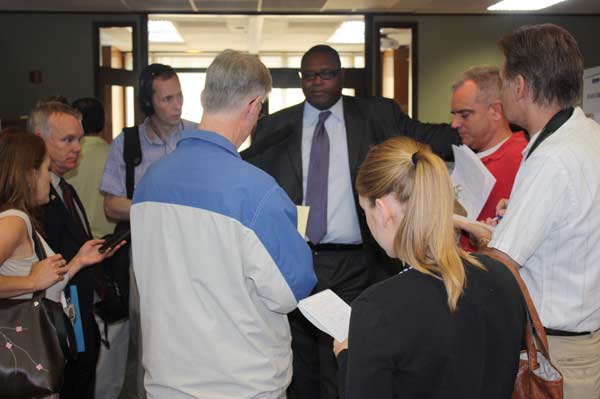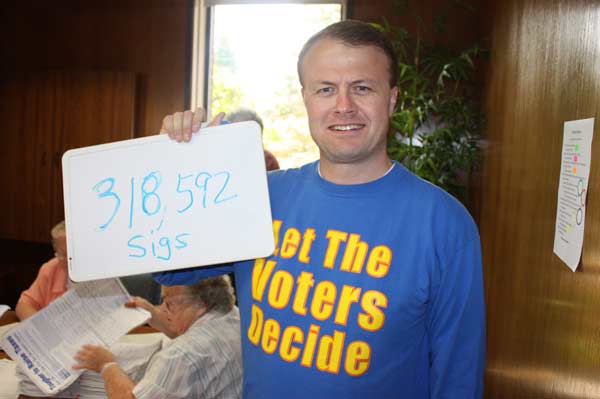Charter school fans, Eyman submit initiative sigs
State Rep. Eric Pettigrew, D-Seattle, a charter schools supporter, talks with the media after I-1240 signatures were submitted Friday morning.
Sponsors of two citizen initiatives have submitted signatures far in excess of the 241,000 bare minimum needed to qualify, and appear to be in good position to make the November statewide ballot. That would bring to six the number of state ballot propositions facing the voters, including gay marriage and marijuana decriminalization.
Friday — four months before Election Day — was the deadline to submit initiative petitions. Out of the dozens that have been filed in 2012, two well-financed campaigns brought in large numbers of signatures. Backers of Initiative 1240, the proposal to authorize charter schools in Washington, submitted an estimated 350,000-plus signatures to the Secretary of State’s Elections Division. Then 90 minutes later, Tim Eyman and other tax rebels submitted an estimated 318,000 signatures for I-1185, to restate the two-thirds vote requirement for taxes passed in Olympia. Fee increases would require a legislative vote, but not supermajority passage.
I-1185 sponsor Tim Eyman displays the number of signatures he said were turned in Friday morning.
Both are widely expected to make the fall ballot, but the Elections Division will do a careful random sample to assure that over 241,000 valid signatures were turned in by Friday’s deadline. The Elections Division has recommended all initiative sponsors to bring in about 320,000 to cover the usual duplicates and invalid signatures. Both would appear to have met that test.
If both indeed qualify, that would make six ballot propositions for voters to consider.
Secretary of State Sam Reed, the state’s chief elections officer, said the six ballot measures are “the high end of average” for a state election.
“This year’s crop, including marijuana and marriage, tax limits and charter schools, should make for a lively ballot and help turnout,” Reed said. “One hundred years after the voters approved the initiative and referendum, the process is alive and well in Washington.”
Neither charter schools nor two-thirds-for-taxes is a new issue for voters. This is the fourth attempt by charter school backers to gain voter approval. They came close in 2000 (48.2 percent yes, 51.8 percent no), and lost by large margins in 1996 and 2004. Charter schools are publicly funded schools that are independently managed by nonprofit organizations and overseen by a local school board or by a state charter school commission. Washington would be the 42nd state to authorize charters, with a maximum of 40 schools formed over a five-year period.
This is Eyman’s third initiative dealing with the tax vote requirement and the fifth time overall that voters have dealt with the issue. All four previous measures passed, including Eyman’s I-960 in 2007 and I-1053 in 2010, and I-601 in 1993 and Referendum 49 in 1998.
The other measures heading to the ballot are:
- Referendum 74, a vote on whether to approve or reject the state’s new law authorizing civil marriage for same-sex couples. The bill was Senate Bill 6239.
- Initiative 502, decriminalizing marijuana sales and use by adults, is already on the ballot. It was an initiative to the Legislature, but lawmakers did not take it up, so it was guaranteed a public vote this fall.
- Two noncontroversial constitutional amendments were placed on the ballot by the Legislature. One, SJR 8221, would implement changes in use of state bond debt, and the other, SJR 8223, deals with investments by the University of Washington and Washington State University.
State Elections Co-Directors Shane Hamlin and Katie Blinn said the initiative checkers began work immediately. First step was to count the number of petition sheets and give a receipt to the sponsor. The charter school measure, for instance, turned in 20,569 petitions. After each sheet is numbered, the petitions will go to the State Archives for imaging. By next Wednesday, the crew expects to start the process is visually inspecting each sheet to check for obvious errors or potential fraud. Then the remaining signatures are counted and sponsors are given that number.
The Elections Division determines the number needed for a 3 percent random check and a computer algorithm chooses the actual signatures to inspect. The checkers will look to see if the signer is a registered voter with correct information fields and a signature that matches the one on file.
The verification check on the charter school measure is expected to begin about Monday, July 16, and take three or four days to complete. The second measure, Eyman’s, then will be checked and should be complete by the end of the week of July 23.
Ballot titles, texts and other info are on our Elections website. Just click, and scroll down: http://tinyurl.com/7keplpk
General election ballots go out by Oct. 19, with military and overseas ballots going out by Sept. 22. Postmark or dropbox deadline is Election Day, Nov. 6.

